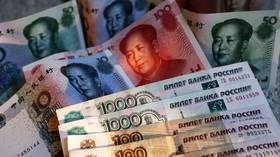
The trade partners have been boosting transactions in national currencies, Aleksandr Novak says

© Sputnik / Aleksandr Demyanchuk
Moscow and Beijing are developing a system of settlements which could allow cross-border transactions without using the Western financial messaging system, SWIFT, Deputy Prime Minister Aleksandr Novak revealed on Tuesday.
The two countries have reportedly accelerated efforts to move away from the US dollar and the euro, towards settlements using domestic currencies.
“In gas contracts we are already switching to settlements in national currencies – in rubles and in yuan – on a parity basis. Supplies of oil and oil products, as well as coal, are also being switched to payment in national currencies,” he explained.
According to Novak, this could help avoid financial risks and facilitate the transformation of the ruble and yuan into world reserve currencies. “In this regard, the Central Bank of Russia and the People’s Bank of China are working on the possibility of opening accounts for Russian companies in China and vice versa, creating a settlement system without using SWIFT,” Novak said.
Russian President Vladimir Putin had earlier called for new independent financial platforms for international settlements, stressing that the global economy should be more open and unbiased.
Moscow has been promoting its own domestic payment system as a reliable alternative to SWIFT since many of the country’s banks were disconnected from the Western financial network earlier this year.
READ MORE: Russian president calls for alternatives to SWIFT
Russia’s SPFS interbank messaging system was created in 2014, and has similar functionality to SWIFT. It ensures secure transfer of financial messages between banks both inside and outside the country.
In April, Russian Central Bank Governor Elvira Nabiullina said most Russian lenders and 52 foreign organizations from 12 countries had received access to SPFS. The regulator added it would keep the identity of the payment system’s members secret to protect them from possibly falling under secondary sanctions from the US and its Western allies.
For more stories on economy & finance visit RT’s business section




